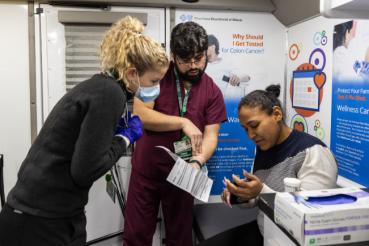Three Rush University faculty members have received funding from the Charles J. and Margaret Roberts Fund for Preventive Medicine to lead groundbreaking research projects aimed at improving the health outcomes of marginalized populations.
Established through a generous bequest made by Charles J. and Margaret Roberts, the fund provides support for the advancement of disease prevention initiatives, as well as six endowed chairs at Rush.
Kirsten A. Dickins, PhD, AM, assistant professor in the Department of Community, Systems and Mental Health Nursing, Rachel Boutté, PhD, MDiv, assistant professor in the Department of Family & Preventive Medicine, and Esther Lee, MD, MPH, assistant professor in the Department of Pediatrics, will begin their projects in early 2024.
“We are grateful for this philanthropic funding, which will propel these transformative initiatives that align with our commitment to health equity and community-driven health care,” said Christine M. Kennedy, PhD, RN, the John L. and Helen Kellogg Dean of the Rush College of Nursing and interim provost and vice president of Rush University. “The support from the Roberts Fund will empower us to make meaningful strides in closing health care gaps and promoting optimal well-being for vulnerable populations.”
The funding will advance innovative research that directly benefits historically underserved communities, including Black American women, individuals experiencing homelessness, and premature infants in low- and middle-income countries. Each of the projects aligns with the Rush Health Equity Strategic Plan to guide collective health equity efforts across the Rush system.
“We take pride in pushing the boundaries of health care research and fostering innovations that directly impact patient outcomes,” said Cynthia Brincat, MD, PhD, acting dean of Rush Medical College. “These research projects reflect our commitment to extending the reach of critical medical interventions locally and globally."
Trauma-Focused Integrated Care for Marginalized Women
Dickins will lead a project aimed at providing trauma-focused, integrated care for women experiencing homelessness and those navigating the criminal justice system.
Black women experiencing homelessness are disproportionately impacted by traumatic stress, yet few trauma-focused programs are tailored for this population. Dickins’ research will leverage a peer-led model that centers the shared lived experiences of unhoused Black women and provides trustworthy guidance toward improved mental health and housing outcomes.
“Dr. Dickins' proposal addressing trauma-focused, integrated care for marginalized women exemplifies the pioneering spirit of our College of Nursing,” said Kennedy.
Short-term goals of her research include expanding the team to provide trauma-focused, integrated health services, leveraging technology for increased access and incorporating physical health evaluations. The long-term vision involves expanding the model to address trauma, in conjunction with providing primary and preventive care services for other vulnerable populations.
Dickins also received competitive funding for this research from the Rita and Alex Hillman Foundation earlier this fall.
Addressing Health Disparities in Black American Women
Recent studies have highlighted the alarming prevalence of obesity, hypertension and Type 2 Diabetes Mellitus among Black American women compared to their white counterparts. Boutté’s research project aims to address the complex and multifaceted disparities in health among Black women, focusing on communication-related factors in health care encounters.
Boutté seeks to develop a community-based patient training program to equip Black women with the skills to communicate more effectively during health care encounters. The culturally specific intervention will be developed in collaboration with patients and clinicians. If successful, this model could be adapted for various patient populations, helping to close the life expectancy gap in Chicago and beyond.
Improving Outcomes to Prevent Blindness Among Premature Infants
Rush University is at the forefront of addressing Retinopathy of Prematurity, or ROP, a leading cause of preventable blindness in children worldwide. With a focus on capacity building and infrastructure development in low- and middle-income countries, Lee’s project aims to optimize long-term outcomes for premature infants. She and her team plan to establish ROP incidence in Kenya, modify a cloud-based data management system for ROP data collection and telemedicine, and validate a low-cost retinal camera for ROP screening.
This initiative — led by Lee as part of a multi-center collaboration with mentors R.V. Paul Chan, MD, at University of Illinois College of Medicine and Kenyan ophthalmologists — builds on the success of similar programs in India, Mongolia and Nepal. The goal is to extend the geographical reach of ROP screening and treatment and improve long-term vision outcomes for infants.




